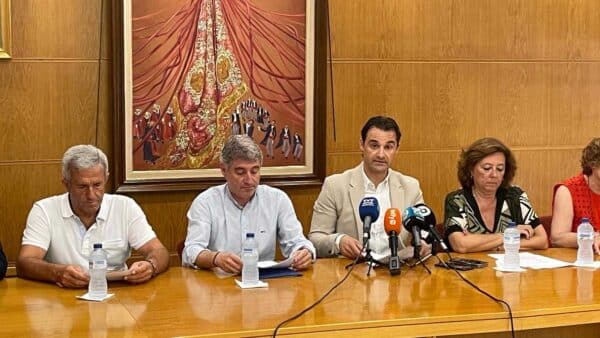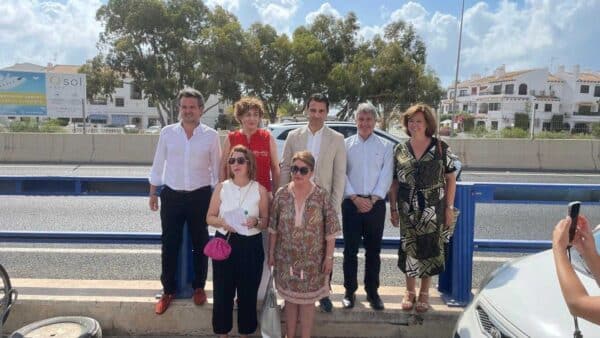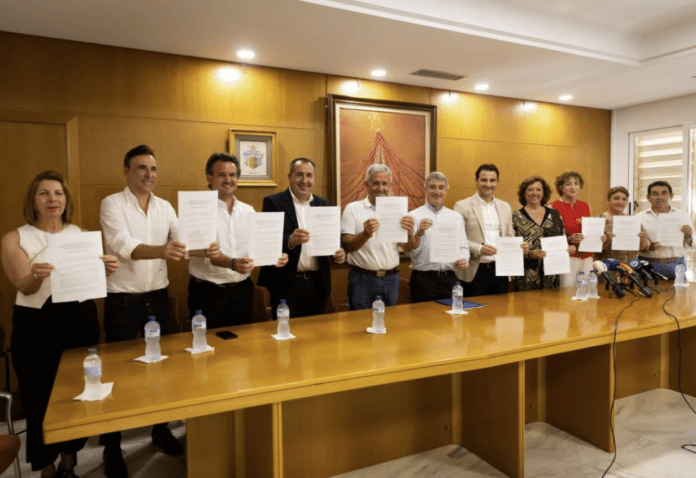- The Government argues that it is impossible because the Alicante ring road is publicly managed while the Los Montesinos-Orihuela Costa section is concessioned to a private company.
They had already expressed their anger and indignation at the announcement by the Minister of Transport, Óscar Puente, to lift the toll on the Alicante ring road and, on Monday, they further expressed this disapproval in a joint statement.
The mayors of Orihuela, Torrevieja and Pilar de la Horadada were joined by many other PP mayors and councillors of the Vega Baja.
At the Orihuela Costa Town Hall, they read out a joint document in which, “in a respectful manner”, they asked the former mayor of Valladolid to extend the measure implemented in the provincial capital to the southernmost region of the Valencian Community, which, according to the councillors, has once again been “ignored” and “forgotten” by the Government of Spain.
The mayor of Torrevieja, Eduardo Dolón, read the joint declaration. At his side were his counterparts from Orihuela, Pepe Vegara; Pilar de la Horadada, José María Pérez; Almoradí, María Gómez; Bigastro, Teresa Belmonte; Benejúzar, Vicente Cases; and Cox, Antonio Bernabéu. Also present were the PP spokespersons in other municipalities including Granja de Rocamora and the deputy mayor of Orihuela, Manuel Mestre (Vox).
The manifesto focuses heavily on data. The mayors note that the Ministry made public in its press release that the A-70 motorway is currently supporting between 80,000 and 95,000 vehicles a day. The Popular Party says that the situation on this road is perfectly comparable to the saturation suffered by the N-332 as it passes through Torrevieja and Orihuela Costa.
The mayor of Orihuela, Pepe Vegara, provided further data. He indicated that the motorway, in its seven kilometres of toll road, supports a traffic of 6,000 vehicles a day, while, immediately south, in Pilar de la Horadada, the traffic increases to 21,000 vehicles. “This means that the N-332 is swallowing up 15,000 extra vehicles that could be circulating on this motorway if there were no toll,” he said.
All this was said just a few metres from the N-332 that both Orihuela residents and tourists use to get around the AP-7, which this summer will be the only toll road that will remain in operation in the entire province of Alicante.

“It should be remembered that, during the summer, this stretch of road is serving a population that far exceeds 800,000 people and brings us close to a million at certain peak times. It is simply unacceptable that all this flow of travel has to be driven on a road with a single lane in each direction,” said Dolón, referring to the daily traffic jam that Torrevieja suffers.
According to the mayor of the salt city, he still has no news from the Ministry after Óscar Puente himself told him during a forum held last May in Alicante that they would begin the tendering of the widening of the N-332 as it passes through Torrevieja.
“We are faced with a measure that has a negative impact on our tourism, makes us lose competitiveness, isolates us even more from other territories and continues to ignore the unsustainable situation of the N-332,” the mayors claimed.
In this regard, the mayor of Pilar was particularly emphatic. José María Pérez showed that his townsfolk are the ones who are most affected by this situation, making any trip to the north of the province a choice between an expensive 20 euro round trip or a long trip via the N-332. Likewise, the manager of one of the most important agricultural cooperatives in Campo de Cartagena said that, in his view, Pedro Sánchez’s Government is subjecting the region to “punishment” with this toll and with the cut in the flows that arrive via the Tajo-Segura Transfer.
In response to questions from the media, the councillors did not rule out starting a campaign of protests if they did not receive a favourable response from the Ministry. The mayor of Bigastro, also a senator, announced that she would present a question to the Government in the next control session in the Upper House and that she had requested a meeting to ask the central executive about its investment plans for the region. A proposal for which, she said, she has still not received a response.

The central government’s reaction to the appearance of the PP mayors was not long in coming. From the Government Subdelegation in Alicante, its head, Juan Antonio Nieves, accused the PP of using “demagoguery to confuse the public.”
According to the subdelegate, “the situation of the Alicante toll has nothing to do with that of the Vega Baja. Since the former was not concessioned to a company, it was publicly managed, and the Vega Baja has a 25-year concession, which was signed by the PP with José María Aznar in Madrid and Eduardo Zaplana in Valencia.”
Nieves said that the PP mayors only make demands on other administrations when they are not governed by their own party. “Without going any further, the president of the Generalitat has decided to change 10 million in road improvement works that were going to be carried out in the Vega Baja to actions in Valencia and we have not heard any complaints from these mayors.” Something similar was said by the popular councillors who took advantage of the meeting to criticise “the complicit silence” of the PSOE in the Vega Baja.





